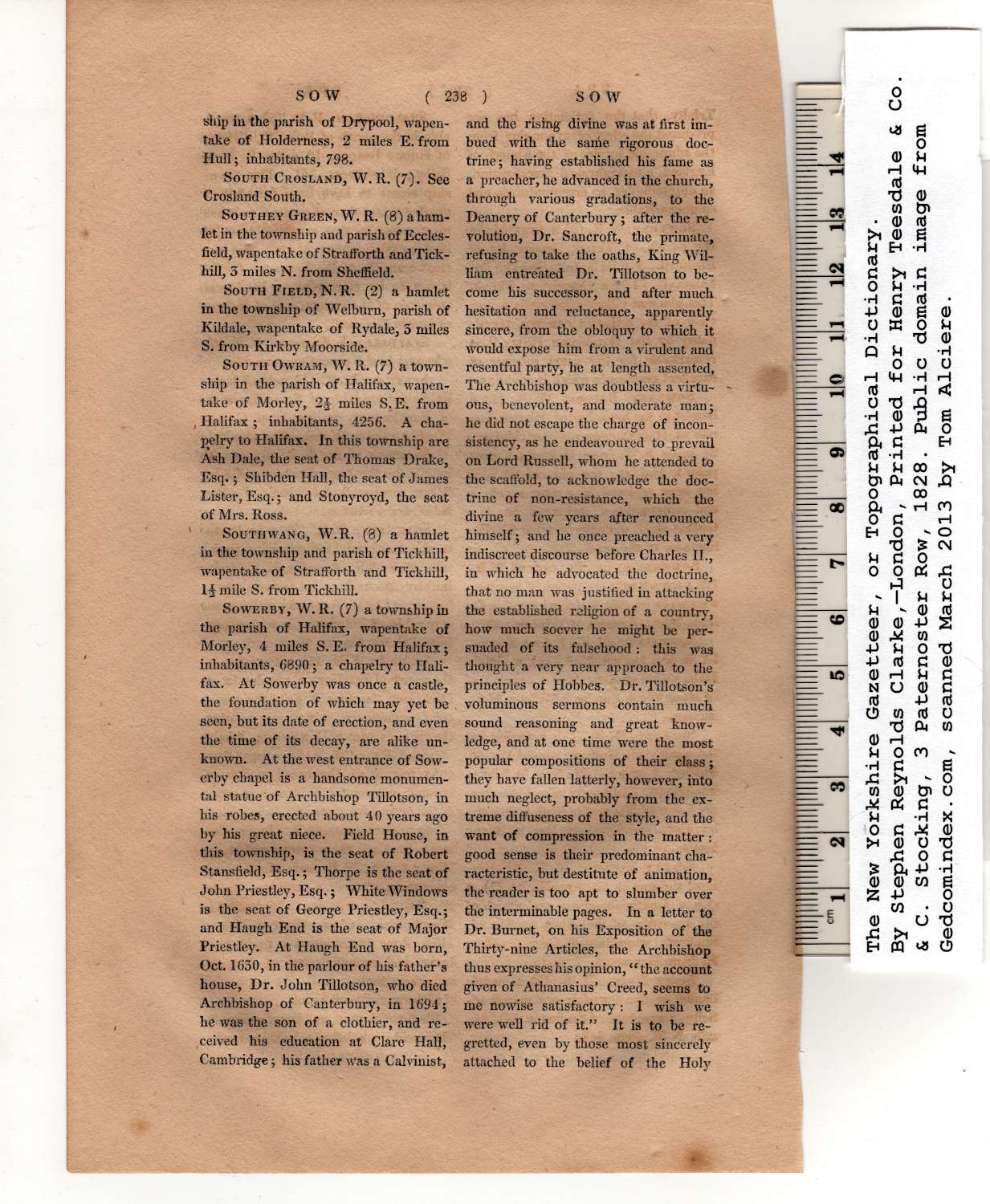|
biiip in the parish of Drypool, wapen-
take of Holderness, 2 miles E. from
Hull; inhabitants, 798.
South Crosland, W.R. (7). See
Crosland South.
Southey Green, W. R. (8) a ham-
let in the township and parish of Eccles-
field, wapentake of Strafforth and Tick-
hill, 3 miles N. from Sheffield.
South Field,N.R. (2) a hamlet
in the township of Welburn, parish of
Kildale, wapentake of Rydale, 3 miles
S. from Kirkby Moorside.
South Owram, W. R. (7) a town-
ship in the parish of Halifax, wapen-
take of Morley, miles S.E. from
( Halifax ; inhabitants, 4256. A cha-
pelry to Halifax. In this township are
Ash Dale, the seat of Thomas Drake,
Esq.; Shibden Hall, the seat of James
Lister, Esq.; and Stonyroyd, the seat
of Mrs. Ross.
Southwang, W.R. (8) a hamlet
in the township and parish of Tickhill,
wapentake of Strafforth and Tickhill,
lfmile S. from Tickhill. |
Sowerby, W.R. (7) a township in
the parish of Halifax, wapentake of
Morley, 4 miles S. E, from Halifax;
inhabitants, 6890; a chapelry to Hali-
fax. At Sowerby was once a castle,
the foundation of which may yet be
seen, but its date of erection, and even
the time of its decay, are alike un-
known. At the west entrance of Sow-
erby cbapel is a handsome monumen-
tal statue of Archbishop Tillotson, in
bis robes, erected about 40 years ago
by his great niece. Field House, in
this township, is the seat of Robert
Stansfield, Esq.; Thorpe is the seat of
John Priestley, Esq.; White Windows
is the seat of George Priestley, Esq.;
and Haugh End is the seat of Major
Priestley. At Haugh End was born,
Oct. 1630, in the parlour of his father’s
house, Dr. John Tillotson, who died
Archbishop of Canterbury, in 1694;
he was the son of a clothier, and re-
ceived his education at Clare Hall,
Cambridge; his father Was a Calvinist,
and the rising divine was at first im-
bued with the same rigorous doc-
trine; having established his fame as
a preacher, he advanced in the church,
through various gradations, to the
Deanery of Canterbury; after the re-
volution, Dr. Sancroft, the primate,
refusing to take the oaths, King Wil-
liam entreated Dr. Tillotson to be-
come his successor, and after much
hesitation and reluctance, apparently
sincere, from the obloquy to which it
would expose him from a virulent and
resentful party, he at length assented.
The Archbishop was doubtless a virtu-
ous, benevolent, and moderate man;
he did not escape the charge of incon-
sistency, as he endeavoured to prevail
on Lord Russell, whom he attended to
the scaffold, to acknowledge the doc-
trine of non-resistance, which the
divine a few years after renounced
himself; and he once preached a very
indiscreet discourse before Charles II.,
in which he advocated the doctrine,
that no man was justified in attacking
the established religion of a country,
how much soever he might he per-
suaded of its falsehood : this was
thought a very near approach to the
principles of Hobbes. Dr. Tillotson’s
voluminous sermons contain much
sound reasoning and great know-
ledge, and at one time were the most
popular compositions of their class;
they have fallen latterly, however, into
much neglect, probably from the ex-
treme diffuseness of the style, and the
want of compression in the matter:
good sense is their predominant cha-
racteristic, but destitute of animation,
the reader is too apt to slumber over
the interminable pages. In a letter to
Dr. Burnet, on his Exposition of the
Thirty-nine Articles, the Archbishop
thus expresses his opinion, “the account
given of Athanasius’ Creed, seems to
me nowise satisfactory : I wish we
were well rid of it.” It is to be re-
gretted, even by those most sincerely
attached to the belief of the Holy |
